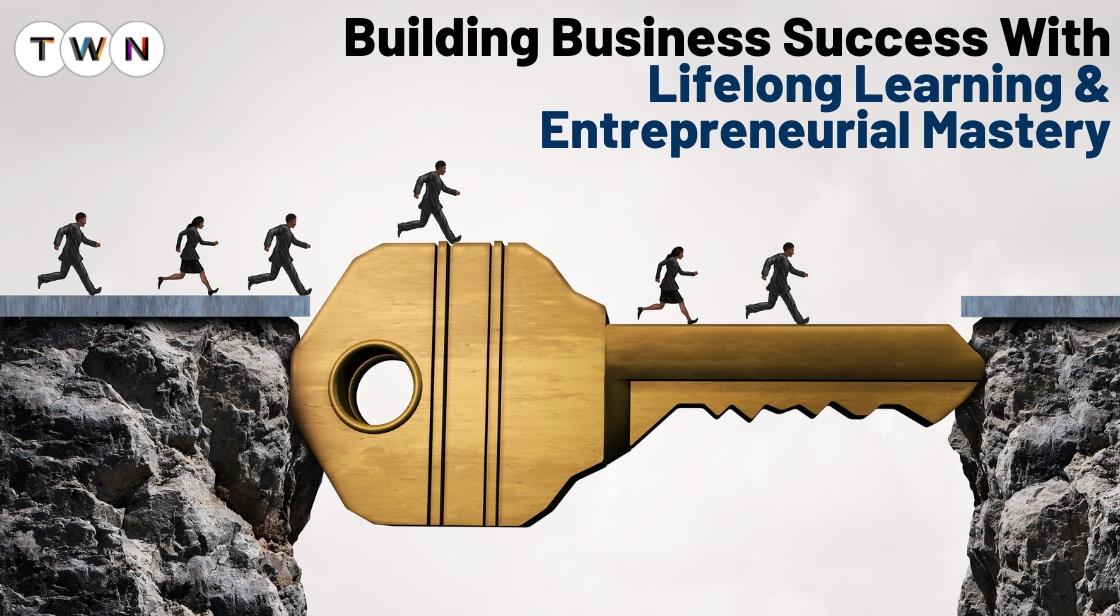Building Business Success with Lifelong Learning and Entrepreneurial Mastery

Blog Post
In the rapidly shifting world of entrepreneurship, maintaining success and fostering growth requires more than just an initial burst of innovation and hard work. As industries evolve and new technologies emerge, entrepreneurs must commit to lifelong learning and continuous skill development to stay ahead of the curve.
This dedication to ongoing education is not merely a strategic advantage but a necessity for sustaining competitiveness and achieving long-term success.
The path to entrepreneurial excellence involves mastering several key areas: mindset, finance, marketing, sales, technology, and leadership.
Each of these domains plays a crucial role in navigating challenges, seizing opportunities, and driving business advancement. By focusing on these areas, entrepreneurs can enhance their ability to innovate, adapt, and thrive in a constantly changing environment.
This blog explores the importance of continuous learning in these critical areas, providing insights into how developing a growth mindset, understanding financial principles, navigating the evolving marketing landscape, refining sales techniques, leveraging technology, and enhancing leadership skills can significantly propel entrepreneurial success.
Embracing these principles equips entrepreneurs with the tools needed to overcome obstacles, capitalize on opportunities, and drive their businesses toward sustained excellence and growth.
The Path to Entrepreneurial Excellence Through Ongoing Learning
In the ever-evolving landscape of entrepreneurship, ongoing education is essential for maintaining success and fostering growth. As industries shift and new technologies emerge, entrepreneurs must remain proactive in enhancing their skills and knowledge to stay competitive.
Six key areas are particularly crucial for entrepreneurial development: mindset, finance, marketing, sales, technology, and leadership. By focusing on these areas, entrepreneurs can effectively navigate obstacles, capitalize on opportunities, and advance their businesses. Exploring each of these domains reveals how lifelong learning can significantly drive entrepreneurial achievement.
1. Cultivating A Growth Mindset
Importance in Entrepreneurship
In the world of entrepreneurship, cultivating a growth mindset is crucial for ongoing improvement and innovation. This mindset is centered on the belief that abilities and intelligence are not fixed traits but can be developed through effort and perseverance. Entrepreneurs who embrace this perspective are more likely to adapt to challenges, persist through difficulties, and continually seek ways to enhance their skills and business practices.
Understanding a Growth Mindset
A growth mindset involves viewing challenges as opportunities rather than threats. Entrepreneurs with this mindset understand that setbacks and failures are not reflections of their abilities but are valuable learning experiences. This approach fosters resilience, allowing individuals to bounce back from disappointments and use them as stepping stones toward future success.
Benefits of a Growth Mindset
Adopting a growth mindset enables entrepreneurs to become more adaptable and open to taking calculated risks. By approaching challenges with a positive and constructive attitude, they can navigate obstacles more effectively and find innovative solutions. This mindset also encourages a continuous pursuit of knowledge and improvement, which is essential in the fast-evolving business landscape.
Practices to Cultivate a Growth Mindset
To cultivate a growth mindset, regular self-reflection is vital. This practice helps entrepreneurs assess their progress, understand their strengths and areas for improvement, and set goals for future development. Seeking feedback from peers, mentors, and customers also provides valuable insights and perspectives that can guide growth.
Staying open to new ideas and embracing change are additional key practices. Engaging with diverse sources of knowledge, exploring new strategies, and being receptive to innovative approaches can further enhance entrepreneurial skills and drive business success.
Transforming Obstacles into Opportunities
Ultimately, a growth mindset transforms obstacles into opportunities. By viewing challenges as chances for growth and learning, entrepreneurs can turn potential setbacks into valuable experiences that contribute to their overall success. This mindset not only supports personal and professional development but also helps in building a resilient and forward-thinking business.
2. Financial Literacy: The Foundation Of Business Success
Financial literacy is a crucial aspect for entrepreneurs who aspire to build and sustain a successful business. It encompasses the understanding and management of financial principles that are essential for making informed business decisions. Here’s a breakdown of why financial literacy is foundational and how entrepreneurs can enhance their financial skills:
Importance of Financial Literacy
For entrepreneurs, financial literacy is more than just a skill—it's the bedrock of business success. This knowledge includes:
-
Understanding Financial Statements: Entrepreneurs must be able to read and interpret financial statements, such as balance sheets, income statements, and cash flow statements. These documents provide insights into a business’s financial health and performance.
-
Managing Cash Flow: Effective cash flow management ensures that a business has sufficient funds to meet its obligations and avoid liquidity problems. It involves tracking incoming and outgoing cash, predicting future cash needs, and making adjustments as necessary.
-
Devising Sound Investment Strategies: Knowledge of investment principles helps entrepreneurs make strategic decisions about allocating resources to various aspects of the business, such as expansion, new projects, or technology upgrades.
Continuous Education and Skill Development
Entrepreneurs should continually educate themselves to stay current with financial trends and regulations. Here’s how:
-
Tax Regulations: Understanding tax laws and regulations helps in optimizing tax liabilities and ensuring compliance. This can prevent costly penalties and maximize tax benefits.
-
Funding Options: Knowledge of different funding sources, such as loans, venture capital, and grants, enables entrepreneurs to choose the best options for their business needs.
-
Financial Management Best Practices: Engaging with online courses, attending workshops, and seeking guidance from financial mentors can provide up-to-date information and practical advice on managing business finances.
Impact on Business Growth and Viability
A solid grasp of financial literacy not only helps in safeguarding the business’s viability but also plays a crucial role in its growth and expansion. By mastering financial principles, entrepreneurs can make more informed decisions, manage resources efficiently, and drive their business toward long-term success.
Also Read: Strategies of entrepreneurship development
3. Navigating The Ever-Changing Marketing Landscape
The marketing field is constantly evolving with new tools, platforms, and strategies emerging on a regular basis. Keeping pace with these changes is crucial for businesses to remain competitive and effective in reaching their target audiences. Here's a closer look at how to navigate this dynamic environment.
The Importance of Staying Updated
In today’s fast-paced marketing world, staying updated with the latest trends is essential. This includes developments in digital marketing, social media, content marketing, and SEO. Effective marketing strategies are vital for engaging target audiences, building brand awareness, and driving sales. Being informed about these trends allows businesses to adapt and leverage new opportunities for growth.
Innovative Approaches at GrabAgile
At GrabAgile, we've embraced innovative marketing approaches to stay ahead. For Example, during the pandemic, we adapted by focusing on online training. We utilized data analytics and targeted advertising on platforms like Google, Facebook, and LinkedIn. This strategy allowed us to reach professionals looking to upskill remotely, effectively expanding our customer base and enhancing engagement rates. This example highlights the importance of agility and responsiveness in marketing strategies.
The Role of Continuous Learning
Continuous learning is a cornerstone of effective marketing. It involves experimenting with new techniques, analyzing performance data, and refining strategies based on outcomes. By continually adapting and experimenting, businesses can better connect with their audience and stand out in a crowded marketplace. This iterative process helps marketers stay relevant and effective in their efforts.
Leveraging Innovation for Success
To succeed in the ever-changing marketing landscape, businesses must remain agile and open to new approaches. Leveraging innovative strategies, such as advanced data analytics and targeted advertising, can significantly impact a company's ability to engage with its audience and drive growth. Embracing continuous learning and adaptability enables businesses to navigate changes effectively and maintain a competitive edge.
4. Enhancing Sales Skills For Sustained Business Growth
The Importance of Sales Skills
Sales are crucial for the success and sustainability of any business. For entrepreneurs, it is essential to continuously refine and develop their sales skills to ensure ongoing growth and success. Effective sales techniques contribute significantly to revenue generation, customer satisfaction, and overall business expansion.
Mastering the Sales Process
A comprehensive understanding of the sales process is vital. This process includes several key stages: prospecting, lead generation, closing deals, and managing customer relationships. Entrepreneurs must excel at each stage to optimize their sales strategy.
-
Prospecting: Identifying potential customers and initiating contact.
-
Lead Generation: Gathering and qualifying leads that show interest in the product or service.
-
Closing Deals: Successfully finalizing sales and converting prospects into customers.
-
Managing Customer Relationships: Maintaining and nurturing relationships to ensure customer satisfaction and repeat business.
Understanding Buyer Psychology
An in-depth knowledge of buyer psychology can greatly enhance sales effectiveness. Understanding what motivates buyers, their pain points, and their decision-making processes allows sales professionals to tailor their approach and address specific needs. This understanding helps in crafting persuasive pitches and overcoming objections.
Utilizing Advanced CRM Tools
Customer Relationship Management (CRM) tools play a critical role in enhancing sales performance. These tools help manage interactions with potential and existing customers, streamline sales processes, and track progress. Advanced CRM systems provide valuable insights and analytics, enabling entrepreneurs to make informed decisions and improve their sales strategies.
The Role of Training and Workshops
Regular training sessions and workshops are essential for keeping sales skills up to date. These sessions offer opportunities to learn new techniques, stay informed about industry trends, and refine existing skills. Continuous learning helps sales professionals remain competitive and effective in their roles.
Driving Revenue Growth and Building Customer Loyalty
By developing strong sales skills, entrepreneurs can drive significant revenue growth and build a loyal customer base. A well-honed sales approach not only boosts immediate sales but also establishes a solid foundation for future opportunities. This, in turn, contributes to the long-term success and sustainability of the business.
5. Leveraging Technology For Innovation And Efficiency
The Role of Technology in Business In the modern digital era, technology plays a crucial role in driving both innovation and efficiency within businesses. Entrepreneurs are tasked with staying abreast of the latest advancements in technology that are pertinent to their industry. This involves adopting and making the most of new software, tools, and platforms designed to optimize operations, boost productivity, and enhance customer experiences.
Keeping Up with Technological Advancements To effectively leverage technology, entrepreneurs must remain informed about current trends and innovations. This can be achieved through several means:
-
Online Courses: These offer targeted learning opportunities to understand and apply new technologies.
-
Tech Conferences: Attending industry-specific events provides insights into emerging tools and strategies.
-
Industry Publications: Regularly reading relevant journals and articles helps entrepreneurs stay updated on the latest technological developments.
Implementing New Technology The adoption of advanced technology enables entrepreneurs to:
-
Streamline Operations: Modern tools and software can automate routine tasks, reducing manual effort and minimizing errors.
-
Enhance Productivity: Technology can facilitate more efficient workflows and enable better time management.
-
Improve Customer Experiences: Cutting-edge platforms and tools can offer more personalized and responsive interactions with customers.
Gaining a Competitive Edge Embracing the right technology not only helps in improving internal processes but also provides a significant competitive advantage. By integrating innovative solutions, entrepreneurs can differentiate their businesses from competitors, adapt quickly to market shifts, and meet evolving customer needs more effectively.
Responding to Market Changes Technology equips businesses with the agility needed to respond promptly to changes in the market. Whether it’s through data analytics, customer feedback tools, or new communication platforms, technology helps entrepreneurs stay adaptable and proactive.
By leveraging technological advancements, entrepreneurs can drive their businesses forward, achieving greater efficiency and fostering ongoing innovation.
6. Developing Leadership Skills To Drive Team Success
Effective leadership is crucial for guiding a business to success. It requires continuous learning and personal growth to effectively lead and inspire a team. Key areas of focus include emotional intelligence, communication skills, and strategic thinking.
Importance of Continuous Learning in Leadership
Leadership is not a static skill but one that evolves with experience and education. Developing emotional intelligence helps leaders understand and manage their own emotions while empathizing with others. Strong communication skills are essential for clearly conveying goals and expectations, while strategic thinking enables leaders to make informed decisions that drive business success. Engaging in ongoing education, mentorship, and leadership programs helps leaders stay updated with best practices and innovative approaches.
Organizational Approach to Leadership Development
In our organization, we prioritize leadership development through regular workshops. These sessions allow team leaders to share their experiences and learn from one another. By discussing real-world challenges and solutions, leaders gain valuable insights that they can apply to their own teams. Additionally, we utilize personality assessments like the Myers-Briggs Type Indicator (MBTI) to understand team members' preferences. This helps in adapting leadership styles to better meet individual needs and foster a more inclusive and supportive work environment.
Benefits of Understanding Leadership Styles
Understanding and adapting different leadership styles is crucial for creating a positive and productive work environment. Effective leaders are those who can align their approach with the needs and preferences of their team members. This adaptability enhances team collaboration, drives motivation, and ensures that everyone is working towards common goals. By investing in leadership development, organizations can build stronger teams, improve productivity, and achieve long-term success.
Conclusion
For entrepreneurs, a commitment to continuous learning is essential for maintaining a competitive edge and achieving sustained success. Emphasizing the development of a growth mindset, improving financial literacy, keeping up with marketing trends, enhancing sales skills, utilizing technology effectively, and refining leadership abilities are crucial steps in establishing a robust business foundation.
By adopting these principles, you position yourself to lead your ventures to greater levels of success and innovation, ensuring you remain prepared for future challenges and opportunities.
You May Like
EDITOR’S CHOICE












